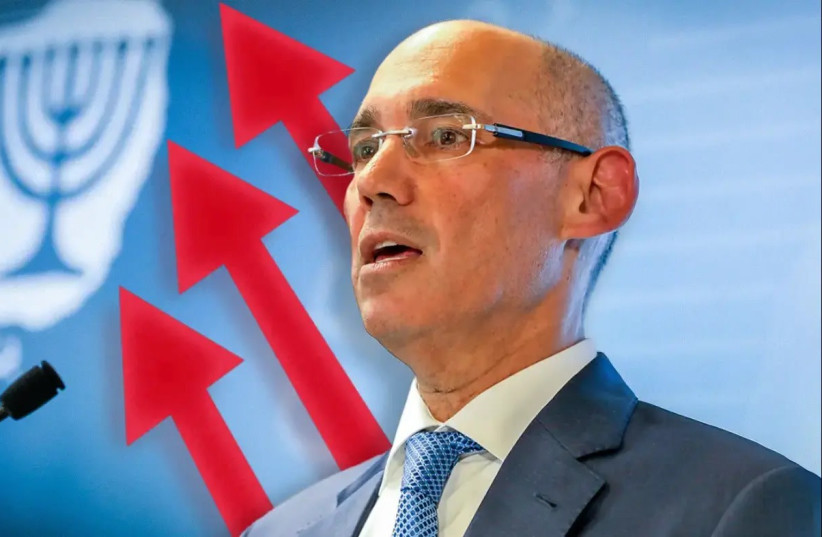The Bank of Israel on Monday left its benchmark interest rate unchanged at 4.5% for the eighth consecutive time. The bank cited geopolitical developments and the moderate recovery of economic activity when explaining the decision.
“The state of the Israeli economy is improving. However, the effect of the war, the uncertainty, and the various challenges are still with us,” said BoI Gov. Prof. Amir Yaron on Monday.
“As the fighting continues, the policy of the Monetary Committee [of the BoI] is focused on stabilizing the markets and reducing uncertainty, alongside price stability and supporting economic activity,” the bank said.
“The path of the interest rate will be determined in accordance with inflation being within the target range, continued stability in financial markets, economic activity, and fiscal policy.”
Restricted supply in some parts of the economy is continuing to slow the closing of the gap between production and the levels of production that long-term trends indicate, the central bank added.

It also highlighted that inflation has remained stable at 3.4%, adding that tax changes, especially the increase of VAT to 18%, along with continued restrictions on supply and excess demand, will likely drive inflation up in the first half of 2025.
This inflation is above the bank’s target rate of between 1% and 3% annually. “Looking forward, the inflation rate is expected to increase during the first quarter of the year to approximately 4%,” Yaron said.
2025 budget
Yaron touched on the 2025 budget, saying it “would have been better to integrate more growth-supporting components for the long and short terms, with an emphasis on removing barriers, and, in particular, to reduce expenditures that create negative incentives to entering the labor market and to increasing productivity. “
He also said it would “have been proper for the government to reduce the number of ministries and to make a substantial contraction in coalition funds that do not support growth,” given the “painful steps” the public has had to bear.
Yaron also commented on the need for increased IDF manpower, reiterating “the importance of broadening the circle of those serving in the army.
“Beyond the social and values-related significance, the current situation in which large parts of ultra-Orthodox society do not serve in the military has a significant economic cost.”
Yaron also emphasized the importance of not adding more challenges or uncertainty at this time through “constitutional changes, without broad agreement.”
“It is necessary to maintain the independence and strength of the institutions. This is part of the country’s economic resilience and a condition for the markets’ trust and sustainable growth,” Yaron explained.
The bank also announced revised predictions for gross domestic product, saying GDP is expected to grow by 0.6% in 2024, by 4.0% in 2025, and by 4.5% in 2026.
“The deficit in 2025 is expected to be 4.7% of GDP,” Yaron said, adding that “in 2026, the deficit is expected to be 3.2% of GDP, mainly due to the end of the war’s direct expenses.”
The predictions for growth in 2024 and 2025 are slightly higher than the bank’s last estimation of these metrics from October.
The bank also noted that the economy’s risk premium has dropped noticeably, although it has remained higher than in the period before the war. The bank also noted that since the last interest rate decision in November, the shekel has strengthened against the dollar and euro.
The bank’s forecast was compiled under the assumption that “the direct economic impact of the war will continue to the end of the first quarter of 2025. This assumption reflects a moderate level of intensity of fighting in the beginning of 2025 as well,” Yaron said.
Twelve of the 13 economists polled by Reuters had predicted prior to the decision that the central bank would leave the interest rate unchanged on Monday but that a cut in February is possible.
